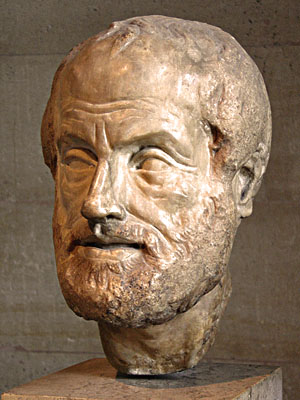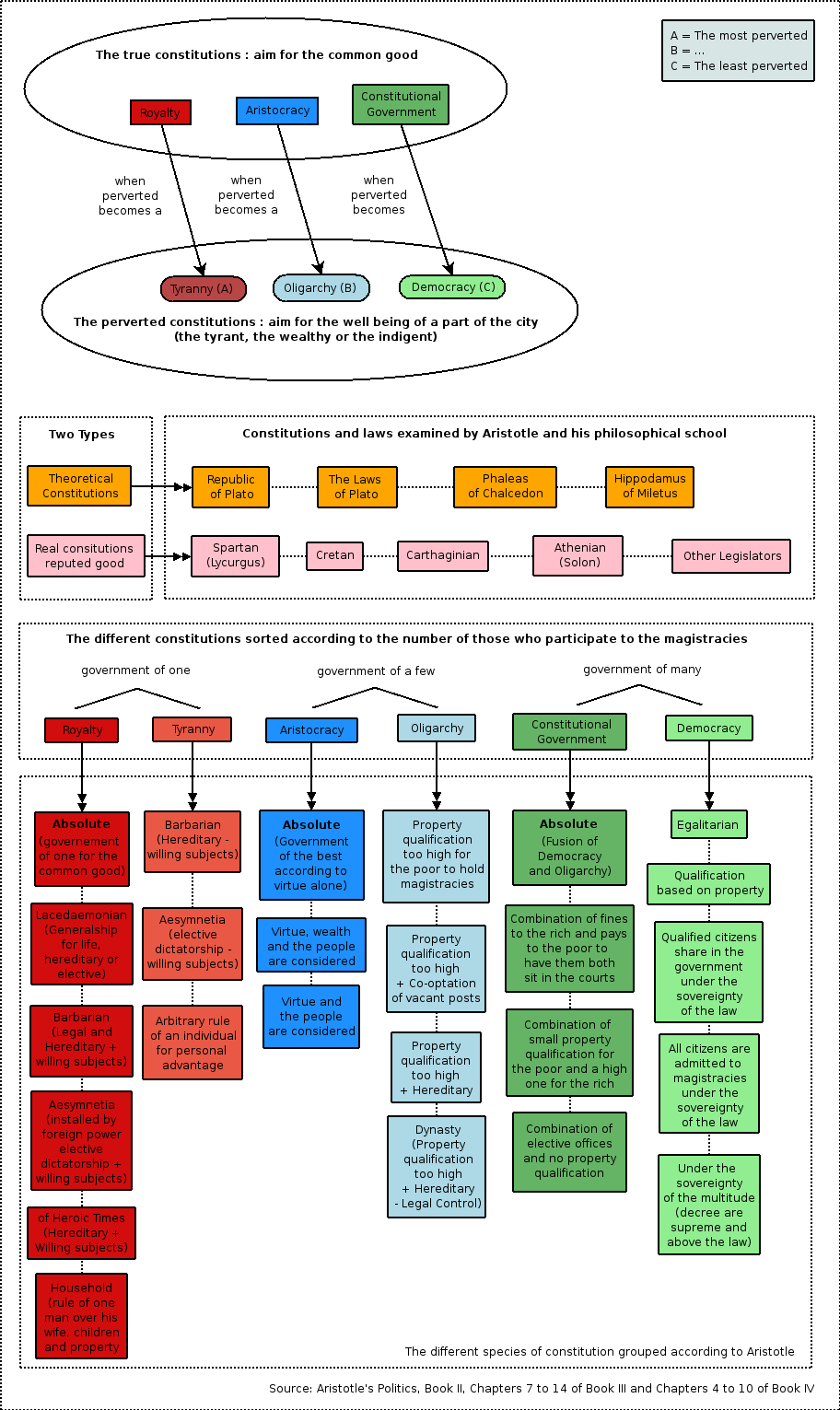

Here, I will attempt an introduction solely to Aristotle's ethics and politics but should for the sake of completeness mention that, among Aristotle's preserved works, we do have his Rhetoric and Poetics, both of which deal with practical rather than theoretical themes. Aristotle's ethics can be viewed as an examination of the nature of "the good" for human beings. It is a teleological undertaking in that it examines what makes for a fulfilled human life. Modern readers may find it surprizing to find that Aristotle really doesn't investigate whether particular actions are good or bad, moral or immoral, as is the focus of most modern ethical theories. Aristotle is more interested in the virtues to be exercised over the span of a lifetime than in particular rules for performing a specific action at a specific time.
Before examining the various specific virtues, Aristotle examines the nature of virtue and considers whether a virtue is to be considered a passion, a faculty or a state of character (NE II 5). As examples of passion he cites appetite, anger, fear and several others. He notes that these are all feelings accompanied by pleasure or pain and argues that virtues cannot be viewed as passions because we can't blame or praise others simply on the basis of their passions. But we can and do praise or blame others for their virtues and vices. Further, there is choice involved in the virtues and vices but not in the case of passions, which we simply experience with no choice in the matter. Faculties, on Aristotle's view, are simply the capacities to feel various passions, so the same arguments apply: A faculty cannot be worthy of blame or praise nor is choice involved. We are thus left with the conclusion that virtues are states of character or dispositions.
 Aristotle then sets about showing that the virtues are all dispositions to the mean between two extremes: Courage
is the mean between the extremes of cowardice and rashness; temperance the mean between self-indulgence and insensibility.
Let's examine this theory a bit more closely in the case of two particularly important virtues to which
Aristotle devotes a great deal of attention: justice and wisdom. After clarifying some ambiguities of the term "justice,"
Aristotle divides the specific virtue of justice into the distributive and the remedial variety. Both of these have to do with
proportion and equality but with some important distinctions. The distribution of goods, Aristotle says, should
proceed according to merit, and he recognizes that different societies define merit in different ways. He doesn't settle
the issue of what the correct view of merit might be but is concerned mainly with the claim that just distribution is
proportional distribution according to the merit of the individuals involved. So, distributive justice isn't a mean between
two extremes in quite the same sense as temperance is but rather distribution in appropriate proportions. The balanced proportion
can of course be seen as a proportion somewhere in the middle between various unbalanced distributions, in which some groups receive
more than they merit and others less. Remedial justice, on the other hand, is the attempt to restore equality
after an injustice has been committed. This kind of justice is to be applied in cases of breach of contract, theft
and various other crimes. The idea here is somehow to restore return the parties involved to a state of equality, taking
into account the pain suffered by the injured party.
Aristotle then sets about showing that the virtues are all dispositions to the mean between two extremes: Courage
is the mean between the extremes of cowardice and rashness; temperance the mean between self-indulgence and insensibility.
Let's examine this theory a bit more closely in the case of two particularly important virtues to which
Aristotle devotes a great deal of attention: justice and wisdom. After clarifying some ambiguities of the term "justice,"
Aristotle divides the specific virtue of justice into the distributive and the remedial variety. Both of these have to do with
proportion and equality but with some important distinctions. The distribution of goods, Aristotle says, should
proceed according to merit, and he recognizes that different societies define merit in different ways. He doesn't settle
the issue of what the correct view of merit might be but is concerned mainly with the claim that just distribution is
proportional distribution according to the merit of the individuals involved. So, distributive justice isn't a mean between
two extremes in quite the same sense as temperance is but rather distribution in appropriate proportions. The balanced proportion
can of course be seen as a proportion somewhere in the middle between various unbalanced distributions, in which some groups receive
more than they merit and others less. Remedial justice, on the other hand, is the attempt to restore equality
after an injustice has been committed. This kind of justice is to be applied in cases of breach of contract, theft
and various other crimes. The idea here is somehow to restore return the parties involved to a state of equality, taking
into account the pain suffered by the injured party.
Intellectual virtues such as wisdom fall outside the scheme of virtues as the mean between extremes. They are dispositions allowing us to recognize particular virtues as well as other objects of knowledge. Wisdom also falls into two types which essentially replicate his dual division of sciences: practical and theoretical wisdom. Practical wisdom is knowledge of what actually is good for human beings, and theoretical wisdom the knowledge of philosophy, mathematics and science. Both types of wisdom are cardinal virtues for Aristotle, although he ultimately concludes that theoretical wisdom is the superior of the two.
Finally, two of the ten books of Aristotle's Nicomachean Ethics are devoted to the topic of friendship. This emphasis on a particular type of social relationship would seem rather out of place in modern ethical theories, which ultimately focus more on the actions of individuals than on the relationships between them. I think that Aristotle's unusually expansive treatment of friendship has to do with his view of human beings as social animals. One should also bear in mind that the Greek concept of friendship includes a wide variety of positive relationships between human beings, certainly including numerous relationships of utility that we would hesitate to describe as actual friendships. One of Aristotle's most interesting conclusions here is that friendship is based on self-love. As Aristotle says:
The bad man does not seem to be amicably disposed even to himself, because there is nothing in him to love; so that if to be thus is the height of wretchedness, we should strain every nerve to avoid wickedness and should endeavour to be good; for so and only so can one be either friendly to oneself or a friend to another. (NE 1166b25-29)
Having now completed a brief introduction to Aristotle's ethics, I'll turn now to his Politics. Here, Aristotle examines the state as a political community aimed toward the good of its members. It is thus clear that ethics and political science are closely related, since ethics is the study of what this good is, and political science examines how it can be realized socially. Aristotle begins by investigating the hierarchies of social units, beginning with the household. The natural impulse of human beings toward political association leads households to band together as villages and villages into states, which are the highest political units. Each level in this hierarchy attempts to satisfy a progressively wider range of human needs. As the highest level of political association, the state thus aims to satisfy all needs of its members. Its ultimate goal is the good life.
Aristotle proceeds to investigate the success of different kinds of governments in achieving these goals. The following chart visualizes his assessment of various constitutional structures:
 Chart created by Mathieu Gauthier-Pilote
Chart created by Mathieu Gauthier-Pilote